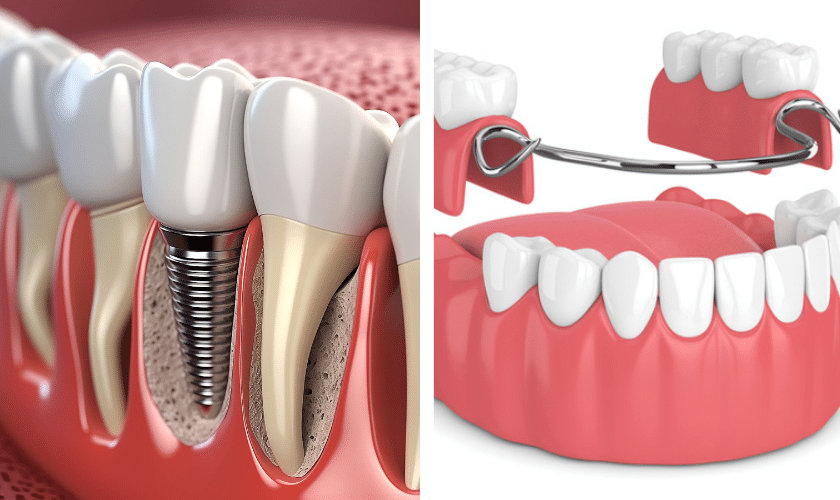When exploring options for replacing missing teeth, individuals often evaluate both dental implants and dentures. Each solution restores a smile and dental function but achieves this through different mechanisms and offers unique experiences. Understanding the fundamental differences between these two common dental restorations is helpful for making an informed choice. This comparison will explore different aspects of both dental implants and dentures, to help guide your decision-making process.
Comparing Function and Comfort
The performance of a dental restoration during daily activities is a key concern for many people. Function and comfort play a role in this decision. These factors depend largely on whether the solution is fixed or removable.
Chewing and Speaking Abilities
Dental implants are designed to mimic natural teeth, providing a stable, secure foundation in the jawbone for confident chewing and clear speech without shifting. In contrast, removable dentures rest on the gums and may require an adjustment period for comfortable chewing and speaking. While adhesives can enhance denture stability, they do not offer the same fixed security as an implant.
Everyday Comfort
Understanding the daily comfort provided by each option is benficial for making an informed decision:
- Dental Implants: Since implants integrate with the jawbone, they feel like natural teeth once healing is complete. Upper implants do not require palate coverage, which preserves a natural sense of taste and temperature. Patients typically adapt quickly and often forget they are present.
- Dentures: Full upper dentures feature a plate that covers the roof of the mouth, potentially affecting the sensation of eating. Some individuals may experience initial discomfort or sore spots during the adjustment period. As the gums and bone may change shape over time, dentures often require periodic adjustments to maintain a comfortable fit.
Examining Longevity and Durability
Understanding the longevity of a dental restoration is beneficial. Dental implants offer a long-term solution, often lasting a lifetime with proper care and regular dental check-ups. Made from biocompatible materials like titanium, the implant post fuses with the bone, providing a durable anchor. Dentures, while durable, typically require replacement or relining every five to ten years due to normal wear and tear and natural changes in the jawbone and gums.
Assessing Care and Maintenance
Daily care routines and long-term upkeep differ between implants and dentures. Both require consistent attention to maintain oral health and the longevity of the restoration.
Daily Cleaning Requirements
Caring for dental implants is very similar to caring for natural teeth. It involves standard oral hygiene practices, including:
- Brushing twice a day
- Flossing daily
This routine helps prevent plaque buildup around the implant, which is beneficial for gum health. Dentures require a separate cleaning regimen. They must be removed for cleaning, typically using a soft brush and a non-abrasive denture cleanser. They should also be soaked overnight to keep them clean and maintain their shape.
Long-Term Care
Long-term care for implants involves regular dental check-ups to monitor implant stability and gum health. Consistent oral hygiene and professional cleanings support the success of the implant. For dentures, periodic adjustments are necessary to maintain fit as the mouth naturally changes over time. Continued care with a dental professional helps prevent discomfort and aids in the longevity of both restorations.
Choose Between Dental Implants and Dentures with Confidence
Choosing between dental implants and dentures depends on a variety of personal factors, including lifestyle, long-term goals, and daily habits. Both options can effectively restore the appearance and function of a smile. To determine the most suitable path for your specific situation, it is best to consult with a dental professional who can provide a thorough evaluation and personalized guidance.

